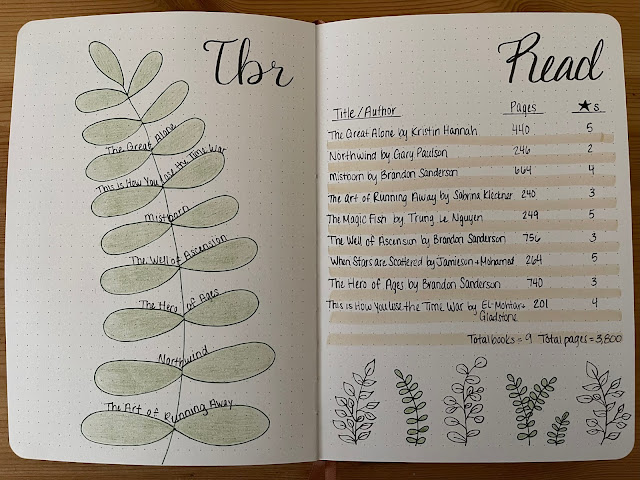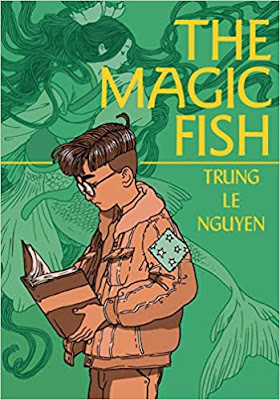 |
| Illustration by Jungho Lee After a pretty rough February, I was determined to get myself back on track in March. I definitely had a better time with my emotions and self care, but I struggled quite a bit with exhaustion. I couldn't bring myself to get back into exercising and I was falling asleep quite a bit. I'm not sure why, because I was getting a normal amount of sleep and everything, but I was just tired. Hopefully I can rally in April. Aside from the sleepiness though, I had a good month. I have kept my 100-pages-a-day streak alive and finished nine books totaling 3,800 pages. This was one book less than I read in February, but I finished the very long Mistborn trilogy this month, and with each book being around 700 pages, that limited how many other books I could finish. My overall ratings were pretty good, with most things I picked up being four or five stars. Here's everything I finished: The Great Alone by Kristin Hannah (5 stars) Northwind by Gary Paulson (2 stars) Mistborn by Brandon Sanderson (4 stars) The Magic Fish by Trung Le Nguyen (5 stars) The Hero of Ages by Brandon Sanderson (3 stars) My favorite read of the month was The Magic Fish, a beautiful middle grades graphic novel about love, family, and the power of stories passed down through time. I also really enjoyed The Great Alone and When Stars Are Scattered. All three of those books made my favorites list. This is How You Lose the Time War was also a very pretty and memorable read. I had a few notable disappointments this month too. Northwind by Gary Paulson was definitely not as good as I was expecting it to be. I wanted another Hatchet, but this story was aimless and repetitive. I also didn't love the Mistborn series. I gave the first one four stars and the others three stars. Not terrible ratings, but also not what I was expecting based on the hype around those books. I hauled a handful of books this month. There were a few coming out from some of my favorite authors that I was looking forward to, so I picked those up. along with a few others. I ended up getting some teacher books too, to plan for next year. Here's what I ended up with: Alone by Megan E. Freeman (middle grades, adventure/survival, dystopia, physical book) The Aquanaut by Dan Santat (middle grades, graphic novel, fantasy, physical book) The Ogress and the Orphans by Kelly Barnhill (middle grades, fantasy, physical book) Anne of Green Gables: A Graphic Novel by Mariah Marsden (middle grades, graphic novel, physical book) Isla to Island by Alexis Castellano (middle grades, graphic novel, historical fiction, physical book) To Paradise by Hanya Yanagihara (literary fiction, physical book) Gallant by V.E. Schwab (young adult, fantasy, physical book) Anne of West Philly by Ivy Noelle Weir and Myisha Haynes (middle grades, graphic novel, physical book) Cress Watercress by Gregory Maguire (middle grades, fantasy, physical book) Breathing New Life into Book Clubs by Sonja Cherry Paul and Dana Johansen (education, physical book) Teaching Writing in Small Groups by Jennifer Serravallo (education, physical book) The Writing Strategies Book by Jennifer Serravallo (education, physical book) I added a total of 12 books to my collection. I decided to donate Northwind, Mistborn, The Well of Ascension, The Hero of Ages, The Art of Running Away, and This Is How you Lose the Time War, so six books left my shelves. Next month, I want to continue working more on my challenges, especially my Middle Grades Mission. I've picked up a lot of interesting-looking books lately and I want to give them a try. Here are my tentative plans: Strange the Dreamer by Laini Taylor Muse of Nightmares by Laini Taylor Exit, Pursued by a Bear by E.K. Johnston My Year of Rest and Relaxation by Ottessa Moshfegh Cress Watercress by Gregory Maguire The Hideaway by Pam Smy Alone by Megan E. Freeman I continued to work on my physical reading journal this month too, but I didn't create individual entries for all the different books I read. I wanted to, but I was so tired all month that I couldn't get it together enough to keep up with it. I did create a TBR page and maintained a page listing all the books I read. I aim to do more with this in April. As far as my non-reading activities went, I did manage to complete a few projects throughout the month. I worked a little bit more on my diamond painting, and I also finally bought a portfolio to store the diamond paintings I have already completed. It was nice to clear off the space on my table that they were taking up! I also completed a few jigsaw puzzles. My first was the Ravensburger Krypt Gradient. It was 631 pieces and it was really fun. The cut on it was really unique and the pieces were all kinds of different shapes. I really like gradient puzzles. They are much easier to put together than you might think. After that, I finished a 500 piece Tangled puzzle. This is part of a set that came with four puzzles. This is the third one I have completed, so I have one left to go before to finish them all. This was a fun one to do because there was enough clear variation in the different parts of the image that I could sort the pieces easily into piles and complete it section by section. The last project I completed was a wooden Ferris Wheel puzzle that I found on Etsy. This actually winds up and plays a song and rotates around. It wasn't too difficult to assemble, but I had to be very careful not to snap any of the skinny wooden pieces as I was slotting them together. I did end up breaking a few, but luckily, the kit included a few extras of the more delicate parts, so it was okay. The only bad part of the project was that it was pretty rough on the hands. You had to push quite hard to get some of the pieces together and the wood was a little splintery. Overall, I really enjoyed it though, and I would definitely build another one. My goal for April is to make significant progress on the diamond painting I'm currently working on. It's looking good so far, but for some reason, I'm finding it more boring to work on than the other ones I have completed. I think the issue is that it uses square diamonds, which are slowly and more finicky. I'm learning that I definitely prefer round diamonds overall. As far as movies and TV shows go, I finished Maid on Netflix this month, and I really liked it. It was so emotional and moving! I also saw The Batman and The Lost City in the theaters. Both were really great, but with totally different vibes. I especially liked The Lost City because I love a romance/adventure, and you don't see a whole lot of those these days. I also saw Turning Red on Disney Plus and thought it was adorable and so relateable. I also watched a few old favorites with my husband this month - The Dark Knight and The Voyage Home. Both were just as good as I remembered. I adore old Star Trek. I tried out one new game as well - Aquarium Designer on Steam. It's basically a game where you build fish tanks. It was relaxing and very low stress. I continued to practice my ukulele as well. I'm much better at Surface Pressure now and I'm working on perfecting Once Upon a Dream from Sleeping Beauty. That will be my first song that uses finger picking. It's surprisingly tough to master. I'm still looking for a way to get more practice time in. I do have my spring break coming up in April, so hopefully I can get some extra practice time in then. So overall, March was a fairly successful month for me. I managed to finish more than I did in February and I felt better doing it. In April, I want to continue to work on my hobbies a bit more and keep focusing on self care. I also want to try and get back to exercising in the gym, which I'm really struggling with right now. I wish I was one of those people that love exercise. It would make things a lot easier! That will never be me though, so I'm going to have to just keep trying. Hopefully April will be my month. |























